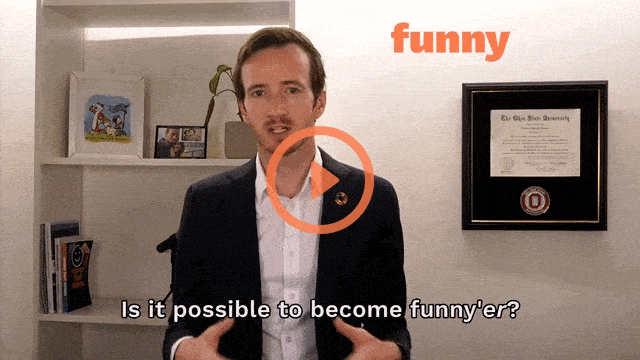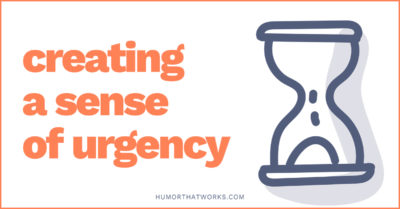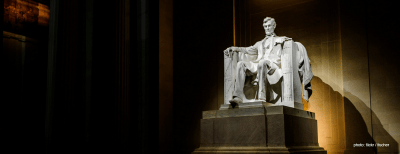As part of our series on Humor in Unexpected Places, and in preparation of the upcoming Democratic Debates, I decided to see what kind of humor was used in the previous debates held on September 12, 2019.
I was curious to know: was humor used, and if so, was it used effectively? Who used it the best, who missed some opportunities, and who missed the mark completely?
My focus was not on the substance of the messages but rather the use of humor to achieve a goal. Disclaimer: This is just one person’s take on the debate and I am by no means an expert in political discourse, only humor.
Before we get to the debate itself, there’s perhaps a more important question to start with:
Should there be humor in debates?
Only if you want people to pay attention. Think about the types of shows and movies we willingly watch in our free time: action, comedy, drama, and educational / documentary. A political debate is, by default, educational and often includes some drama. You’re not likely going to get much action on a debate stage unless WWE takes over, so that leaves comedy.
Personally, I think there should be a lot more humor in debates. Not only as a way to get more people to watch, but also as a strategy for individual candidates to get their messages heard and understood. Does that mean I think every answer should be a joke? Not at all, but humor could certainly be used as an effective debate strategy.
So, was there humor in the debate?
Yes. Was there a lot? Not really. From the first pass, I counted 25 moments of laughter in the 2.5 hours of talking. That gives us a Laughs-per-Minute (LPM) score of 0.16, or roughly one laugh every six minutes.
By comparison, comedy movies typically have ~2 LPM, while good TED talks are at 3-4 LPM.
What were some examples of humor being used well in the debates?
Despite the paltry 0.16 LPM of the debate, there were some great examples of humor being used effectively.
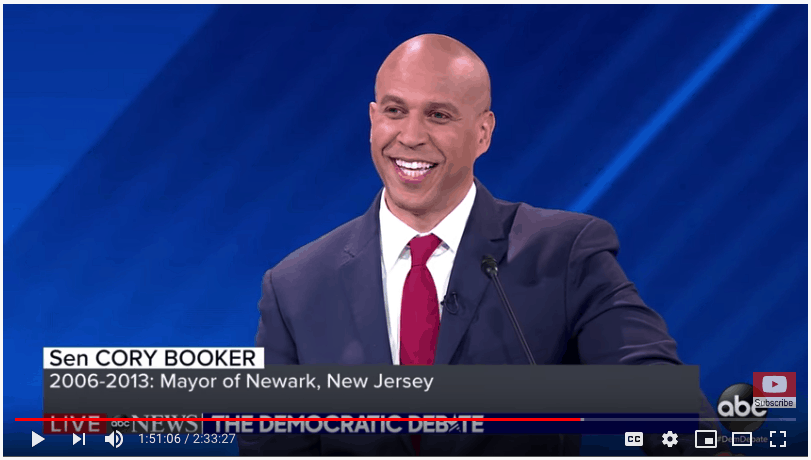
Cory Booker. 1:50:49 – when asked, “Should more Americans borrow your diet?” Booker’s response was, “First of all, I want to say no. Actually I want to translate that into Spanish, no.”
This was the biggest laugh of the night. He made a clear joke, it made reference to the fact that Buttigieg and O’Rourke previously spoke Spanish in the debate, and the joke set himself up to give a good answer to what was a bit of an “out there” question.
Pete Buttiegeg. 1:23:02 – on Donald Trump: “You know when I first got into this race, Donald Trump scoffed and said he’d like to see me making a deal with Xi Xian Ping… I’d like to see him make a deal with Xi Xiang Ping.”
It’s a good burn that flips Trump’s insult back onto Trump. That gives him points with a Democratic audience and builds interest in how he answers the rest of the question.
Elizabeth Warren. 2:16:55 – answering the last question on resilience: “I’ve known what I wanted to be in second grade. I wanted to be a public school teacher. I invested early, I used to line my dollies up and teach school. I had a reputation for being tough but fair…”
She shares a nice story that gives more of her background, includes nuggets of humor throughout, and shows she recognizes how she is perceived.
What were some examples of humor being used poorly in the debates?
Not all humor is created equal. There were a few attempts at humor that fell flat.
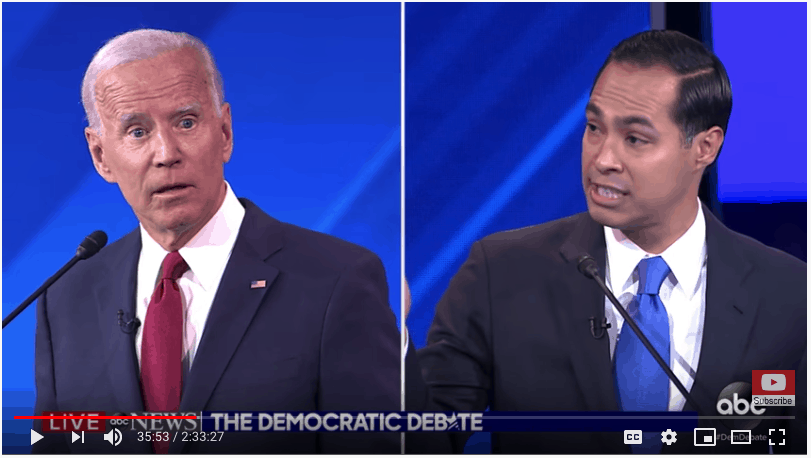
Julian Castro. 0:35:54 – in an exchange with Biden: “I’m fulfilling the legacy of Barack Obama, and you’re not.”
This comment came immediately after what many considered to be a potential crack at Biden’s age / memory (“Are you forgetting what you said two minutes ago?”). It’s hard to tell if this was meant to be a “burn” or a straight up insult, but either way, it came across as very aggressive and would have probably been best to just leave out.
Andrew Yang. 1:58:52 – giving his plan which he called “Democracy Dollars.”
I don’t think this was supposed to be a joke, but it seems like the audience (and other candidates) took it as one. This, combined with the “Freedom Dividend,” makes the plan sound like a farce. A different name could help, as could Yang having a sense of humor about the name if he senses that the audience isn’t onboard with it.
What humor could have been stronger?
A few candidates had a couple of attempts at humor that were fine, but could have also been much stronger if the delivery or timing had been better.
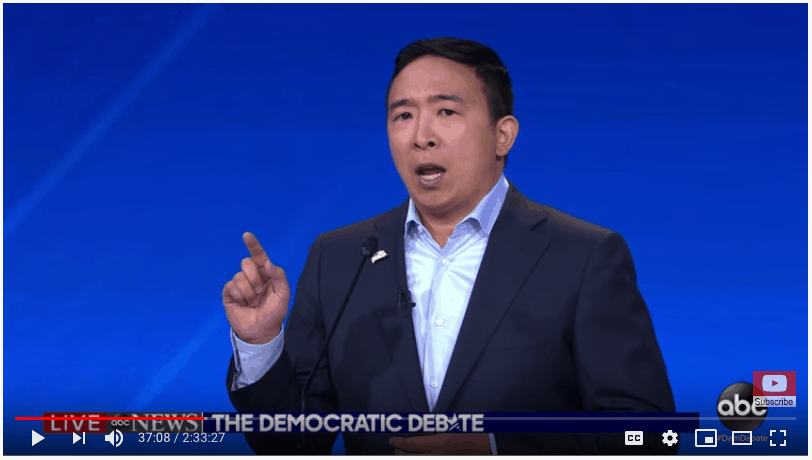
Andrew Yang. 0:37:10 – “I am Asian, so I know a lot of doctors.”
It’s not a great joke to begin with (it’s playing on stereotypes) but the delivery made it sound worse, like he was bragging about it rather than trying to make a joke. He could have set the joke up referencing stereotypes, “I know a lot of doctors, and no, not because of the stereotype that I’m Asian…” Though the best delivery would probably be not to deliver this one at all.
Cory Booker. 1:34:16 – “I am the only person on stage that finds Trudeau’s hair very menacing, but they are not a national security threat.”
This is a really solid joke. I think the audience just missed it and he didn’t give time for people to laugh (what’s called, “stepping on your laughter”). Had he given slightly more setup (“As the only completely bald person up here…”), it probably would have landed stronger.
Could there have been more humor used?
The biggest thing I noticed was that there were a lot of missed opportunities for using humor by each of the candidates. That’s not to say they should be trying to use one-liners as often as possible, just that a little more humor may have helped their cause.
For example, the opening statements are a great place to show your personality. The audience knows you’ll get into more serious topics later, so why not start with a story or observation and allow people to get to know you as a human, something Amy Klobuchar and, on a lighter scale, Elizabeth Warren did well.
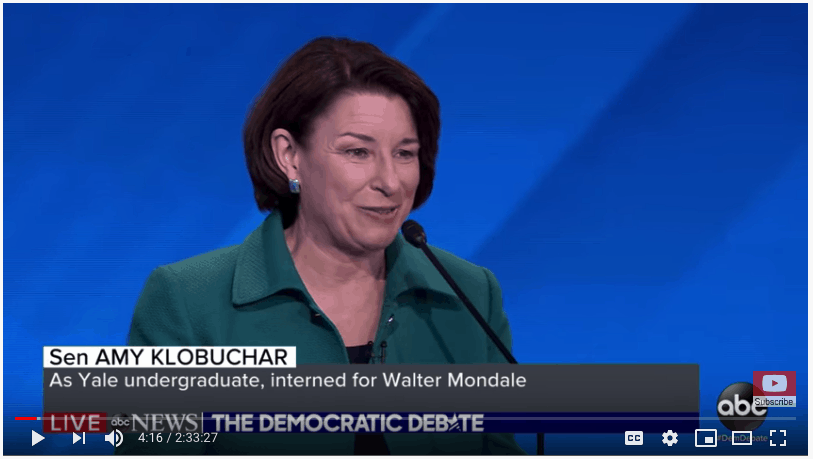
Amy Klobuchar. 04:10 – “I may not be the loudest person up here but I think we’ve already got that in the White House. Houston, we have a problem.”
Elizabeth Warren. 13:17 – “I was born and raised in Oklahoma but I am sure glad to be in Texas tonight…”
Another natural spot is in the closing statements. Each candidate was asked to share a time of professional resilience. This is an easy question to include a little humor in the response. They all answered with a story, which is a great starting point, but only a few used it at a chance for some self-deprecating humor.
Booker and Warren used humor particularly well, balancing a relevant anecdote with humorous details.
Elizabeth Warren. 2:16:55 (shared above) – “I’ve known what I wanted to be in second grade…”
Cory Booker. 2:25:13 – “My biggest professional setback is embarrassing because a lot of people know about it… If you’re going to have a spectacular failure, have a documentary team there to capture it, because it made for an Oscar nominated documentary called Street Fight. But unfortunately another set back, it lost to a documentary called March of the Dangon Penguins for crying out loud.”
All of the others could have used a little more humor in their responses.
There were also a few other spots in the debates that individual candidates could have used humor to build a stronger case.
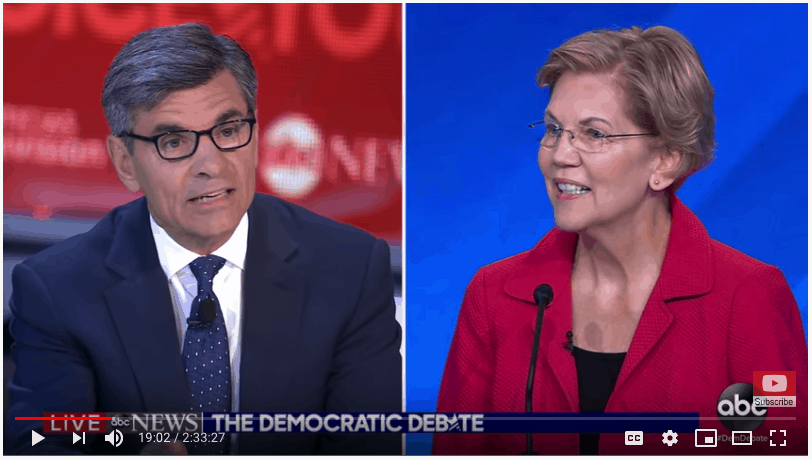
Elizabeth Warren. 0:18:53 – Warren was asked a direct question in response to a previous statement: “will taxes on middle class families’ go up?” Her response was “What families have to deal with is total cost…”
She could have given a metaphor, such as: “What matters is total cost. Focusing on just the taxes is like when you buy something that’s $10 more expensive because it saves you $5 in shipping…”
Or, “This is a simple math equation, and I love math, just check my plans. You have to understand the total costs…”
Using humor here would deflect some of the criticism of the directed question and keep people from focusing on the fact that she didn’t actually answer the direct question.
Kamala Harris. 0:45:20 – The moderator gave the history of some of Harris’ previous actions, “You used to oppose the legalization of marijuana, now you don’t. You used to oppose outside investigations of police shootings, now you don’t.” The moderator went on to say, “When you had the power, why didn’t you try to effect change then?”
Harris had a brief look of “How dare you ask me this question” then smiled, stating “I’m glad you asked this question and there have been many distortions in my record.”
Given the tough question, it wasn’t a bad response, but she could have started immediately with a smile and a slight nod that showed she recognized the importance of the question, or she could have deflected back towards a common target of the Democrats: “I’m willing to admit when I make a mistake, unlike a certain someone who insists covfefe is a word. But there are some distortions in my record…”
Or she could have playfully addressed that it was a tough question. “I am glad you are not holding back any punches,” delivered with a smile.
Andrew Yang. 1:45:51 – The moderator mentioned other people’s military experience and then asked Yang, “What makes you most qualified to be commander-and-chief?” Yang went straight into, “I signed a pledge to end forever wars…” ignoring the question about experience.
To start, he can make any comment (not even humorous) to thank the people on the stage for their service. Then he could comment that that shouldn’t be a disqualifier before going into his plans. “You don’t have to have military experience to be a great leader, as Barack Obama, Bill Clinton, or even Sansa Stark from Game of Thrones, have shown.”
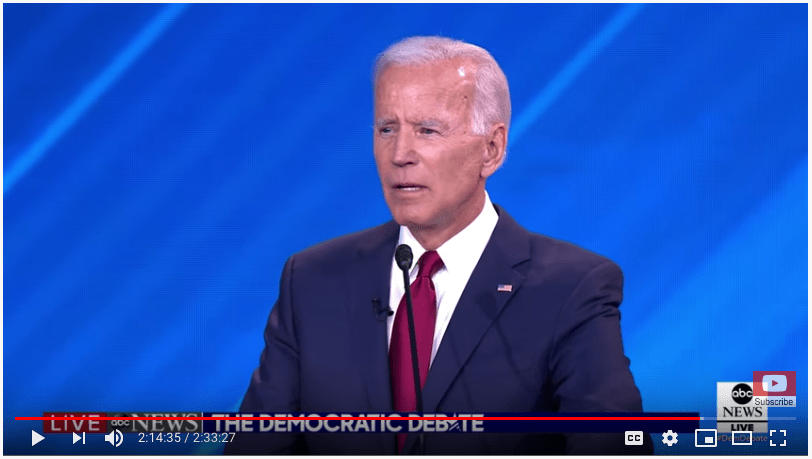
Joe Biden 2:14:35 – As Biden began to give an answer, protesters started shouting. He stood there, waiting for them to be escorted out, eventually restarting over like it never happened.
In these situations, it can be important to “call the room,” where you acknowledge what just took place. If you don’t, everyone wonders if you’re flustered or upset by what took place. Nearly any comment would work here. “They’re clearly excited.” “We’ve got passionate people here.” Or “Resilience is moving on after a disruption.”
So, how did each of the candidates do using humor?
The humor effectiveness of the candidates fell into three buckets: Above Average, Average, and Below Average.
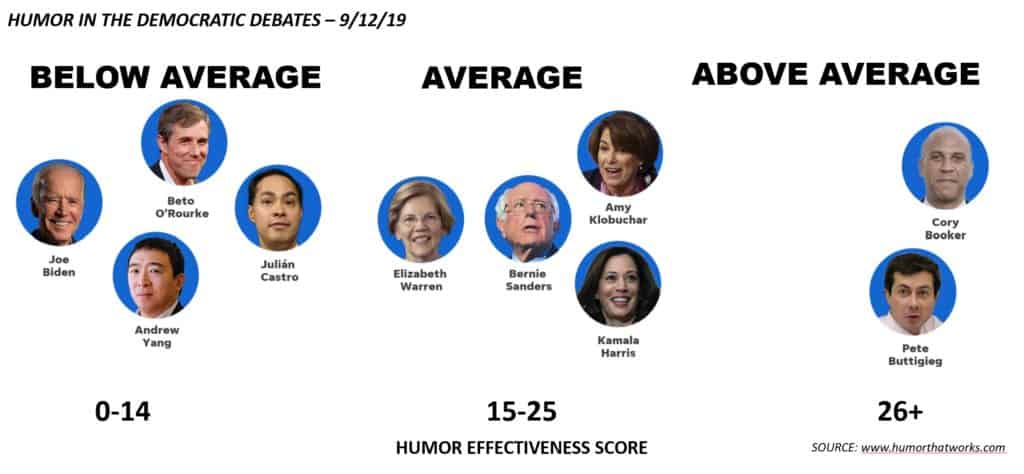
Above Average means the candidates did a great job using humor to the point that it stood out from the evening and left a positive impression on the audience (or at least me).
Average means the candidate used an expected amount of humor that didn’t hurt their perception at all and may have boosted it some, but not significantly.
Below Average means the candidates didn’t do well with humor, have significant room for improvement, and may have actually had a negative impact to their perception.
There were two clear humor leaders that stood out: Booker and Buttigieg. Klobuchar and Harris weren’t too far behind. And two people who didn’t do so well regarding humor: Biden and Yang.
I’ve shared the “Humor Effectiveness Score” (HES) for each candidate. For every humor attempt in the debate, and in some cases, the missed opportunities, I rated the effectiveness on a scale of -5 to 5. The HES is the sum of that score for each candidate.
Effectiveness was a subjective measure that included audience reaction, humor delivery, and humor purpose.
Above Average Candidates in Humor Use
30 – Cory Booker. The most effective in their use of humor was Booker. He had a number of punchlines throughout the evening and a lot of great connections and asides for his ideas. He quoted a number of people with good quips, had self deprecating humor with his hair, told stories, and performed very well. He also had the biggest laugh of the entire night (“No, let me translate that to Spanish, No”).
29 – Pete Buttigieg. The second was Buttigieg. He used humor well, as a way to make transitions, own the stage, call the moment, and reference what else was said, all as he set up his own answers. He wasn’t as “funny” as Booker but he was just about as effective.
Average Candidates in Humor Use
25 – Amy Klobuchar. Klobuchar was the first to start with some humor, right out of the gate. She had some well structured jokes with planned humor, but she had some opportunity in how she delivered the lines to improve their receptivity.
25 – Kamala Harris. Harris seemed to have some of the most fun and control on stage. She had a couple of good planned burns against Trump, shared some effective stories, and made good use of facial expressions. At some points, she came across as a bit too aggressive or too proud of her own comments.
22 – Bernie Sanders. Sanders has such a clear persona on stage that much of his humor comes from him being him, not because he’s setting up a joke. It didn’t seem like he made much of an attempt at humor as none of his comments were particularly funny, but they did work for his persona.
15 – Elizabeth Warren. Warren didn’t use a ton of humor, but she did use it effectively, particularly in her story response to the resilience questions, perhaps the best answer in that section. There were some opportunities for her to show more of her personality in addition to her plans.
Below Average Candidates in Humor Use
12 – Julian Castro. While Castro had some good off-the-cuff humor and a good closing story, his biggest challenge was coming across as aggressive. His comments towards Biden, and then later defending himself against Buttigieg, gave a perception of being a bit of a bully.
9 – Beto O’Rourke. Part of the challenge with O’Rourke was that he didn’t seem to speak all that much in total. He had some good quips with points to remember, but, perhaps because of recent events, he came across as somber and not particularly inspiring or happy to be there.
8 – Andrew Yang. You certainly want to give Yang credit for trying. His stories worked well in general and he had a couple of jokes planned, they just didn’t land well, partly due to content, mostly because of delivery. He also had two awkward moments with unintentional humor.
5 – Joe Biden. The biggest challenge for Biden was some big misses that impacted how he was viewed on stage. Protesters are tough to deal with but pretending it didn’t happen prevents the audience from moving on. He also had a few gaffes and times where he misspoke that undermined some of the other humor he used.
What can we learn from this?
There are a few core ideas anyone can takeaway from the debate:
- Using humor effectively is no easy task, particularly in a debate format. It requires practice and skill to do well.
- Just because it’s hard doesn’t mean it’s not worthwhile. Humor is an incredibly powerful communication tool that can improve the receptivity of a message along with likability of the speaker.
- It’s best to have a mix of planned humor (based on topics, location, and likely questions), while also being open to using off-the-cuff comments in the moment. Both improve with practice.
To check out our analysis of future debates, or other case studies on humor, sign up for our humor newsletter.
This post is a part of our series on Humor in Unexpected Places.


